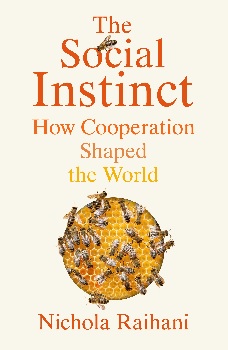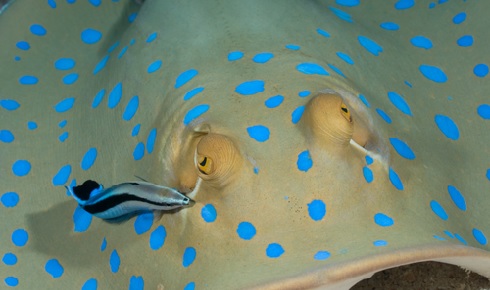Nichola Raihani FRSB: The Social Instinct

Nichola Raihani FRSB talks to Tom Ireland about her new book, The Social Instinct – which explores how all life on Earth – from genes to nation states – is built upon cooperation

8th June 2021
Hi Nichola. Can you tell me a bit about your research background and how you came to write a book on cooperation?
I'm an evolutionary biologist by training. I did my PhD in the Department of Zoology at Cambridge, essentially chasing birds around the Kalahari Desert for a few years. I studied a species of bird called the pied babbler – they live in the desert in tight knit family groups where only one male and one female breed. Everyone else in the group is a helper who helps to raise the offspring of the dominant pair.
After that I started to work on the mutualism between the cleaner fish that live on tropical coral reefs and other fish. In that system, the cooperation is interesting because it’s not just happening between non-relatives, but between members of completely different species.
The confluence of those two strands of research in a way dovetailed into what I mostly do now, which is research on humans. A lot of human cooperation does occur within the family, but we also have this completely other set of cognitive strategies that we use to facilitate social interactions with non-relatives and with strangers that we might never meet again.
So I’ve been trying to understand human behaviour from the viewpoint that we are just another social animal on Earth, and looking at what we can learn about ourselves by looking at other social species.
People are familiar with the idea that the ‘survival of the fittest’ has driven the wonderful innovations we see in nature. Do you think the way that life works together and ‘teams up’ at various scales is overlooked when people think about why life on Earth is the way it is?
People do tend to think about life as being relentlessly competitive. I don't necessarily disagree with that: one of the key messages in my book, which echoes what Dawkins said in The Selfish Gene, is that cooperation is, at heart, a means by which entities are more able to compete. Cooperation evolves because it allows entities to get ahead. And in the end, on a genetic level, there have to be somehow benefits that either derive back to the individual, or via its relatives, for cooperative strategies to be under positive selection.
Life on Earth as we know it would not exist without cooperation and I don't think that that point is necessarily obvious to people. Nor is the idea that we, as individuals, are actually massive collectives of genes, cooperating inside genomes and cells all working together.
Another misconception is the tendency to automatically think of warm and fuzzy things, like family groups supporting each other. But you highlight many examples of cooperation that actually involve very uneasy or conflicted relationships between the cooperating groups.
Yes – one of the key messages in the book that is not that intuitive is that cooperation at one scale can sometimes undermine cooperation at another scale. So one of the best examples of that which is really easy to understand concerns cancer.
Our whole multicellular existence as a coherent individual is a feat of cooperation, and yet sometimes, unfortunately, some cells in the body start pursuing their own agenda – they become cancerous. For a long time it was thought that if you have a tumour it would all be the same cell type. But actually, now we know that the most invasive and dangerous kinds of cancer are actually formed from really quite diverse communities of cells that cooperate. They help each other evade the immune response, or increase resource delivery to the tumour, or disperse to set up new tumour sites. So, in a way, a tumour is a cooperative community that is working for its own ends. Obviously this exacts a really heavy toll on the host organism, and you see that sometimes you can have cooperation that really has victims.
Another example comes from a story I read about Uber drivers. At one particular airport, when the drivers arrived they would turn off the app that shows their location. As people came off the plane and requested an Uber, the apparent high demand and low supply would generate ‘surge pricing’. Then everyone turns the app on again and the passengers have to pay more to be taken home.
Again, there is cooperation, and yes it generates benefits to a subset of the population. But it also generates costs to another. So that’s a really key point that I would like people to come away with, that we always think of cooperation as being this thing we should encourage and this morally laudable thing to do. In fact, that's not always the case. Nepotism is a form of cooperation; corruption is a form of cooperation. It’s not always positive.
Talking of Uber drivers, there’s passages of the book where the cleaner fish you studied behave like they are running their own small independent businesses.
Yes. The cleaner fish hold these small territories which we call cleaning stations, and at the cleaning station they offer a service to all the fish who might come by that station to remove parasites and other nasty stuff from the surface of their skin. They’re a bit like the hairdressers of coral reefs.
 A cleaner fish tends to a blue spotted stingray
A cleaner fish tends to a blue spotted stingray


